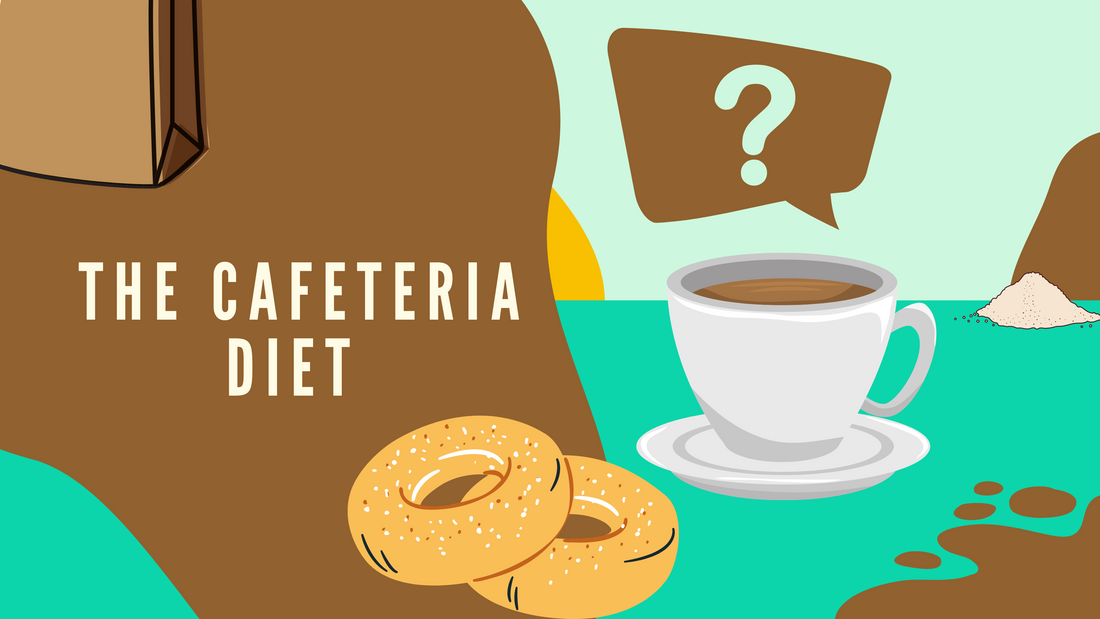The prevalence of childhood obesity worldwide increases to the point of being considered a public health concern. More often than not, overweight is the outcome of the regular Western diet ingestion, rich in industrialized high caloric density food.
Obese children and teenagers are five times more susceptible to be obese in adulthood than those who are not obese. A cafeteria diet is mainly a diet equivalent to the Western diet. This diet promotes overfeeding and overweight because of the deadly combination of artificial trans fats, refined sugars, and excessive sodium.
“The consequences of this diet during childhood can last for a lifetime.”
First and foremost, trans fats, otherwise known as industrial trans fats or partially hydrogenated fats, are hazardous to health. These fats occur when vegetable oils subdue to extreme heat temperatures. As a result, complex fat molecules form, which gives them a much longer shelf life. Inside our body, the challenging molecule cannot be broken down quickly by our digestive system. Studies and clinical trials suggest that trans fats can damage the inner wall of blood vessels, significantly increasing the risk of heart disease and inflammation. Additionally, fats may magnify insulin resistance and type 2 diabetes.
Next, natural sugars occur mainly in foods like fruits, dairy, and grains rich in fiber, vitamins, and minerals. Therefore, making them more beneficial than refined sugars. Natural sugar is extracted from these foods to produce refined sugar.
Table sugar is a typical example of refined sugar, typically extracted from sugar cane plants or sugar beets. Refined sugars are sweeter and often used to add flavor, bulkiness, or act as a preservative.

Consuming large amounts of refined sugars, especially in beverages, can promote a range of detrimental health effects. For instance, extra sugar may cause you to become resistant to leptin. This hormone signals your body when to stop eating, explaining the link between refined sugars overfeed and excess belly fat. Moreover, diets rich in refined sugars lead to a higher risk of depression, dementia, liver disease, and certain types of cancer.
In a previous post, we addressed the cardiovascular effects of high sodium intake. Consequences such as water retention, increase tension, alterations in blood vessels structure, altered brain blood flow, and stiff arteries. This salt excess comes mainly from processed foods. High blood pressure is a significant risk factor for heart disease and stroke, especially for overweight individuals.
“About 9 in 10 children in the United States eat more sodium than recommended. About 1 in 6 teenagers have raised blood pressure.”
As such, some of the most significant children and teenagers' choices in early life are about their health. A balanced diet and being physically active can help them feel good, look good, and do their best in school or sports. But most importantly, these healthy habits can prevent diseases such as diabetes, high blood pressure, heart disease, osteoporosis, stroke, and some cancers when older. Parents and caregivers can positively influence their children in the way foods are produced, sold, prepared, and served.
As a parent and caregiver, you can:
-
Model healthy eating for your children by having a diet rich in whole fruits, cereals, and vegetables.
-
Compare Nutrition Facts labels to choose the lowest trans fat, added sugar, and sodium option before you buy.
-
Request restaurant nutrition information to make better health choices.
“Wholefort products support a healthy diet, no trans fat, no added refined sugars, and shallow content of sodium makes them a no-brainer for children and teenagers.”

Antonio Gomez, RDN, Nutritionist at Wholefort


98 comments
https://sites.google.com/view/movers-riyadh/
https://sites.google.com/view/movers-riyadh/movers-mecca
https://sites.google.com/view/movers-riyadh/home
https://sites.google.com/view/movers-riyadh/movers-jedaah-elhamdniah
https://sites.google.com/view/movers-riyadh/movers-yanbu
https://sites.google.com/view/movers-riyadh/movers-najran
https://sites.google.com/view/movers-riyadh/movers-Jizan
https://sites.google.com/view/movers-riyadh/jazan
https://sites.google.com/view/movers-riyadh/taif
https://sites.google.com/view/movers-riyadh/moversjeddah
https://sites.google.com/view/movers-riyadh/movers-abha
https://sites.google.com/view/movers-riyadh/movers-elahsa
https://sites.google.com/view/movers-riyadh/movers-elkhobar
https://sites.google.com/view/movers-riyadh/movers-elkharj
https://sites.google.com/view/movers-riyadh/movers-elmadina-elmnowara
https://sites.google.com/view/movers-riyadh/movers-eljubail
https://sites.google.com/view/movers-riyadh/movers-elqassim
https://sites.google.com/view/movers-riyadh/movers-hafrelbatin
https://sites.google.com/view/movers-riyadh/movers-elbaha
https://sites.google.com/view/movers-riyadh/movers-jeddah
https://sites.google.com/view/movers-riyadh/movers-dammam
https://sites.google.com/view/movers-riyadh/movers-taif
https://sites.google.com/view/movers-riyadh/movers-burydah
https://sites.google.com/view/movers-riyadh/movers-tabuk
https://sites.google.com/view/movers-riyadh/movers-hail
https://sites.google.com/view/movers-riyadh/movers-khamis-mushait
https://sites.google.com/view/movers-riyadh/movers-rabigh
https://sites.google.com/view/movers-riyadh/madina
https://sites.google.com/view/movers-riyadh/mecca
https://sites.google.com/view/movers-riyadh/dammam
https://sites.google.com/view/movers-riyadh/jeddah
https://sites.google.com/view/movers-riyadh/ahsa
https://sites.google.com/view/movers-riyadh/cleaning-mecca
https://emc-mee.com/blog.html شركات نقل العفش
اهم شركات كشف تسربات المياه بالدمام كذلك معرض اهم شركة مكافحة حشرات بالدمام والخبر والجبيل والخبر والاحساء والقطيف كذكل شركة تنظيف خزانات بجدة وتنظيف بجدة ومكافحة الحشرات بالخبر وكشف تسربات المياه بالجبيل والقطيف والخبر والدمام
https://emc-mee.com/cleaning-company-yanbu.html شركة تنظيف بينبع
https://emc-mee.com/blog.html شركة نقل عفش
اهم شركات مكافحة حشرات بالخبر كذلك معرض اهم شركة مكافحة حشرات بالدمام والخبر والجبيل والخبر والاحساء والقطيف كذلك شركة رش حشرات بالدمام ومكافحة الحشرات بالخبر
https://emc-mee.com/anti-insects-company-dammam.html شركة مكافحة حشرات بالدمام
شركة تنظيف خزانات بجدة الجوهرة من افضل شركات تنظيف الخزانات بجدة حيث ان تنظيف خزانات بجدة يحتاج الى مهارة فى كيفية غسيل وتنظيف الخزانات الكبيرة والصغيرة بجدة على ايدى متخصصين فى تنظيف الخزانات بجدة
https://emc-mee.com/tanks-cleaning-company-jeddah.html شركة تنظيف خزانات بجدة
https://emc-mee.com/water-leaks-detection-isolate-company-dammam.html شركة كشف تسربات المياه بالدمام
https://emc-mee.com/ شركة الفا لنقل عفش واثاث
https://emc-mee.com/transfer-furniture-jeddah.html شركة نقل عفش بجدة
https://emc-mee.com/transfer-furniture-almadina-almonawara.html شركة نقل عفش بالمدينة المنورة
https://emc-mee.com/movers-in-riyadh-company.html شركة نقل اثاث بالرياض
https://emc-mee.com/transfer-furniture-dammam.html شركة نقل عفش بالدمام
https://emc-mee.com/transfer-furniture-taif.html شركة نقل عفش بالطائف
https://emc-mee.com/transfer-furniture-mecca.html شركة نقل عفش بمكة
https://emc-mee.com/transfer-furniture-yanbu.html شركة نقل عفش بينبع
https://emc-mee.com/transfer-furniture-alkharj.html شركة نقل عفش بالخرج
https://emc-mee.com/transfer-furniture-buraydah.html شركة نقل عفش ببريدة
https://emc-mee.com/transfer-furniture-khamis-mushait.html شركة نقل عفش بخميس مشيط
https://emc-mee.com/transfer-furniture-qassim.html شركة نقل عفش بالقصيم
https://emc-mee.com/transfer-furniture-tabuk.html شركة نقل عفش بتبوك
https://emc-mee.com/transfer-furniture-abha.html شركة نقل عفش بابها
https://emc-mee.com/transfer-furniture-najran.html شركة نقل عفش بنجران
https://emc-mee.com/transfer-furniture-hail.html شركة نقل عفش بحائل
https://emc-mee.com/transfer-furniture-dhahran.html شركة نقل عفش بالظهران
https://emc-mee.com/transfer-furniture-kuwait.html شركة نقل عفش بالكويت
https://emc-mee.com/price-transfer-furniture-in-khamis-mushit.html اسعار شركات نقل عفش بخميس مشيط
https://emc-mee.com/numbers-company-transfer-furniture-in-khamis-mushit.html ارقام شركات نقل عفش بخميس مشيط
https://emc-mee.com/new-company-transfer-furniture-in-khamis-mushit.html شركة نقل عفش بخميس مشيط جديدة
https://emc-mee.com/transfer-furniture-from-khamis-to-riyadh.html شركة نقل عفش من خميس مشيط الي الرياض
https://emc-mee.com/transfer-furniture-from-khamis-mushait-to-mecca.html شركة نقل عفش من خميس مشيط الي مكة
https://emc-mee.com/transfer-furniture-from-khamis-mushait-to-jeddah.html شركة نقل عفش من خميس مشيط الي جدة
https://emc-mee.com/transfer-furniture-from-khamis-mushait-to-medina.html شركة نقل عفش من خميس مشيط الي المدينة المنورة
https://emc-mee.com/best-10-company-transfer-furniture-khamis-mushait.html افضل 10 شركات نقل عفش بخميس مشيط
https://ataralmadinah662300791.wordpress.com/شركة الصقر الدولي لنقل العفش والاثاث وخدمات التنظيف المنزلية
https://ataralmadinah662300791.wordpress.com/شركة الصقر الدولي لنقل العفش والاثاث وخدمات التنظيف المنزلية
https://ataralmadinah662300791.wordpress.com/شركة الصقر الدولي لنقل العفش والاثاث وخدمات التنظيف المنزلية
شركات نقل عفش واثاث بجدة
شركات نقل عفش بالطائف
اسعار وارقام شركات نقل العفش بالمدينة المنورة
دينا نقل عفش جدة ,افضل دينا
ارخص شركه نقل عفش بجده
دليل شركات نقل العفش بجدة
شركة نقل عفش برابغ ,15 عام خبرة
شركات نقل عفش واثاث بالباحه
وسائل نقل العفش بخميس مشيط
https://companymoversriydah.wordpress.com/
https://companycleaning307819260.wordpress.com/
https://companymoversjeddah.wordpress.com/
http://bestmoversfurniture.wordpress.com/
https://companyhouseservice.wordpress.com/
Like!! I blog frequently and I really thank you for your content. The article has truly peaked my interest.
https://ipsnews.net/business/2022/04/20/slimcore-gummies-reviews-is-it-safe-for-losing-weight-ingredients-here/
https://ipsnews.net/business/2022/04/20/zinc7-supplement-reviews-ingredients-side-effects-pros-cons-here/
https://ipsnews.net/business/2022/04/20/ketotrin-reviews-melt-fat-fasy-without-diet-or-exercise/
https://ipsnews.net/business/2022/04/20/goddess-molecule-complex-reviews-get-skinny-after-30/
https://ipsnews.net/business/2022/04/21/septifix-reviews-worried-about-your-septic-tank-must-read/
https://ipsnews.net/business/2022/04/21/rezola-hair-growth-reviews-21-days-remedy-to-regrow-hair/
https://ipsnews.net/business/2022/04/21/essential-cbd-extract-reviews-how-hemp-oil-combat-pain/
http://ipsnews.net/business/2022/04/22/hidragenix-reviews-ingredients-side-effects-pros-cons-here/
http://ipsnews.net/business/2022/04/22/acv-rx-capsule-reviews-users-imposed-with-side-effects-learn-truth/
http://ipsnews.net/business/2022/04/22/aqua-triplex-reviews-does-fish-oil-extracts-support-heart/
https://ipsnews.net/business/2022/04/26/regal-keto-pills-reviews-accelerate-the-reduction-of-body-fat/